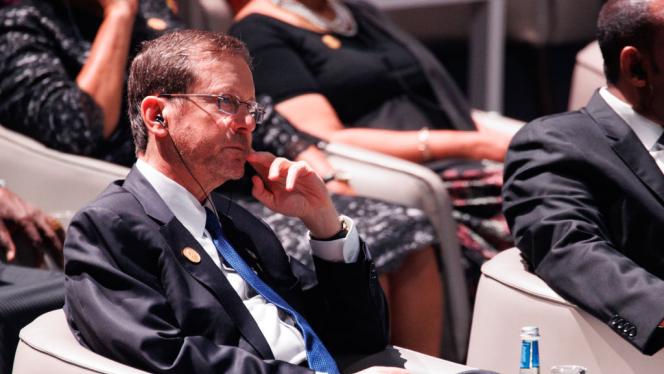Friday 15 November 2024
The Spectacle of Genocide: From Rwanda to Gaza

It is a bitter joke that Israeli president Isaac Herzog received a wreath at the genocide memorial in Rwanda while his country is accused of investigating one itself
The Israeli President, Isaac Herzog, participated on April 7th in commemorating the Rwandan genocide in 1994, on the same day marking the seventh month of Israel's ongoing genocide against Gazans. Herzog's defense of his country at the event revealed Israel's worst face, justifying its crimes in a narcissistic manner befitting Israeli behavior.
This occasion holds special significance, reminding of Palestine's historical position on the continent. Since the 1970s, many African countries have adopted a supportive stance towards Palestine in international forums, with most recognizing Palestine as an independent state. The Al-Aqsa Flood operation on October 7th, 2023, and Israel's subsequent genocidal response, posed a significant test to Palestine/Israel's standing in Africa. Historically, Africa stood with Palestinian rights until the 1960s when Golda Meir, then Israeli Foreign Minister (and later Prime Minister), made inroads into the continent. However, relations soured after the 1973 war, leading to Israel's near-complete expulsion from Africa. Israel gradually restored its ties with African countries in the 1980s. These relations experienced another boost during the recent administrations of Prime Minister Benjamin Netanyahu. Netanyahu visited Africa five times (more than any other Israeli Prime Minister), and Israel opened several new embassies and economic offices in the continent, especially in East Africa. However, most African countries continue to support resolutions condemning Israel since the start of its ongoing genocide in Gaza. The African Union Security Council voted in favor of an independent international investigation into Israeli violations of international humanitarian law in Gaza during the 2024 African Summit, citing Israel's use of internationally banned weapons targeting hospitals and media institutions in its war on the territory.
The Rwandan President, Paul Kagame, was right in his speech, despite being accused of committing massacres in the Congo (by supporting the “March 23 Movement” rebellion in eastern Democratic Republic of the Congo). Accepting such statements at an event meant to honor African lives lost is not to justify new atrocities but rather an ideal opportunity to remember and condemn them. It’s almost a bitter joke that Herzog receives a wreath at the genocide memorial in Rwanda while his country perpetrates documented massacres, scenes of which fill screens and social media feeds, accumulating with every passing hour. Naturally, this cannot be separated from Rwanda’s official stance, long influenced by Israel. Herzog has met with Kagame and Rwandan officials in private meetings discussing hostage issues and “highlighting the need for a joint war against terrorism worldwide,” which remains one of Israel’s avenues to pursue its interests in conflict-ridden countries.
When President Paul Kagame blames international complacency for allowing genocide while simultaneously turning a blind eye to genocide in Gaza by hosting the head of state responsible, he undoubtedly loses his way and disrespects the commemorative occasion where the Rwandan community gathers to heal. Moreover, he aligns himself with a regime that was complicit with the Hutu government in carrying out the Tutsi genocide. Various reports have documented Israeli government military support, including arms supply, to the Hutu regime during the four-year Rwandan Civil War from 1990 to 1994.
There is a clear intersection between the two genocides: complicity. During the Rwandan genocide, as evidence of atrocities mounted, the international community remained silent, ignored the genocide, and even then-U.S. President Bill Clinton denied that the ongoing killings constituted genocide, fearing political and legal pressures that would necessitate U.S. intervention and force the United Nations Security Council to send forces to stop the massacre. However, four years after the genocide, Clinton would go to Rwanda to offer an apology, claiming that he and his administration “did not fully appreciate the depth and the speed with which you were engulfed by this unimaginable terror.” Yet, reports about the scale of killings were flowing from the U.S. Embassy in Kigali.
It’s almost a bitter joke that Herzog receives a wreath at the genocide memorial in Rwanda while his country perpetrates documented massacres, scenes of which fill screens and social media feeds, accumulating with every passing hour
For Clinton administration, as evidenced by Biden’s current stance, the lives of Africans/Palestinians remain less important than internal political risks related to their reelection. Clinton feared, after the overwhelming failure of his military intervention in Somalia in 1993, in the operation dubbed “Restore Hope,” that any further foreign intervention would negatively impact his reelection. The French in Rwanda rushed to save themselves and their pets without lifting a finger to stop the genocide against the Tutsi. On the contrary, France immersed itself in its colonial delusions regarding spheres of influence and supported the extremist Hutu government that led the genocide. Finally, French President Emmanuel Macron admitted, during the annual commemoration of the genocide, that his country and its allies could have stopped the genocide but they “lacked the will to do so,” even though evidence of the crime was staring them in the face.
It remains ironic that a state committing such a declared magnitude of massacres in Gaza participates in this painful commemoration. Often, Israel’s compound of narcissism and racial prejudice drives it to such extremes of mockery. However, it’s essential to note that the genocide in Rwanda paved the way for the establishment of the International Criminal Court in 2002, with jurisdiction over war crimes and crimes against humanity. It served as an impetus for the establishment of the “Responsibility to Protect” principle, adopted by all UN member states in 2005. This principle obliges governments to act against direct threats of genocide, war crimes, ethnic cleansing, and crimes against humanity.
In contrast to Rwanda, which is touted by international organizations as the rising African face, South Africa filed a lawsuit against Israel in the International Court of Justice last December, accusing it of committing genocide against Palestinians in Gaza. South Africa argued in its case before the court that Israel’s actions were deliberate and amounted to genocide. It relied on repeated statements by Israeli officials, sometimes resembling what happened in Rwanda, that the attack on Gaza was more than just targeting Hamas and rose to the level of genocide. Israeli President Isaac Herzog himself explicitly stated that there are no innocent civilians in Gaza, and that “all Gazans bear responsibility for the events of October 7th.”
Journalist Chris McGreal was among the reporters who covered the Rwanda genocide, and he recently wrote an article in The Guardian, stating that while the investigation conducted by the International Criminal Court deserves commendation, it will be too late to save those who still face bombs, bullets, and famine in Gaza. He emphasized that Israel’s allies must do more than just express concern and rise to the level of lessons they claim to have learned from Rwanda. In his belated acknowledgment of guilt, Clinton said, “We must never again be ashamed to face the evidence.” However, it seems that the United States and the rest of the international community have yet to learn the lesson, remaining mere spectators.










